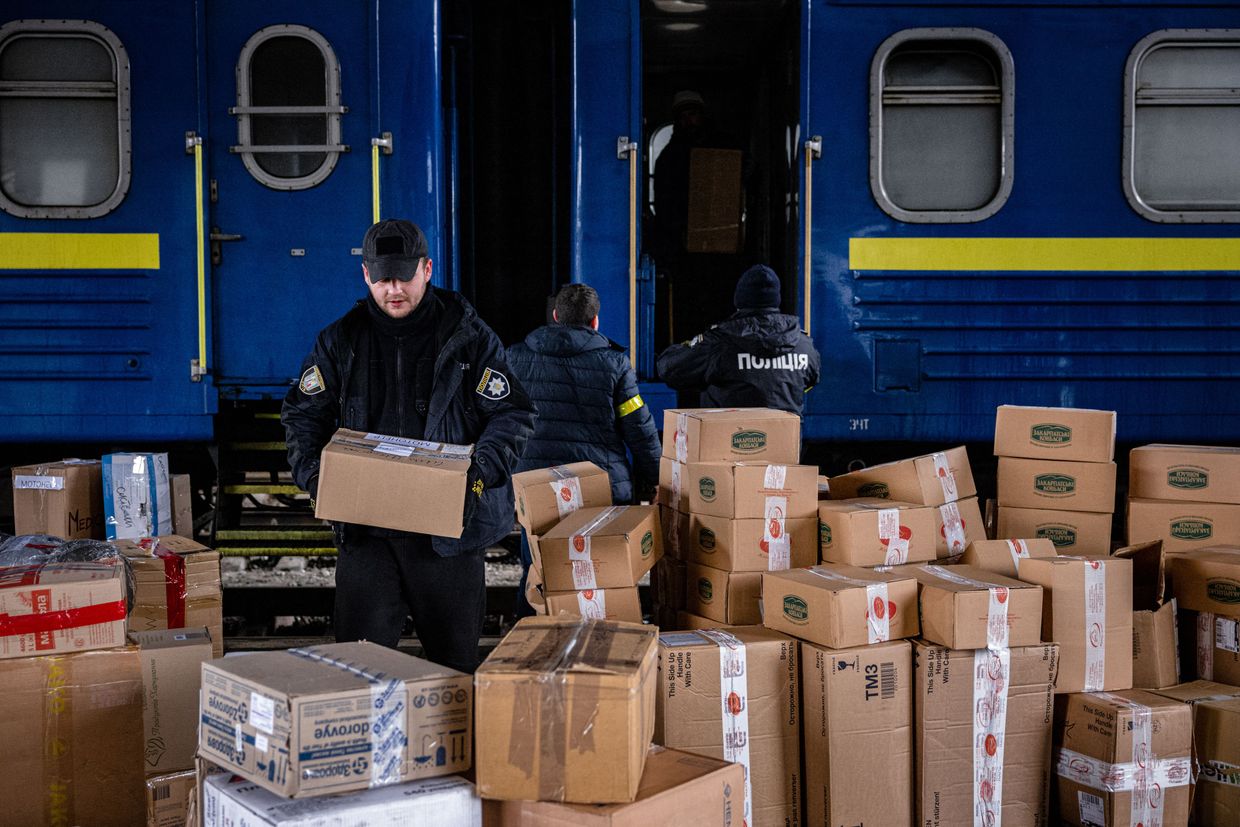A slipping CPI score signals Ukraine’s anti-corruption efforts are stagnating
Ukraine's drop in the 2024 Corruption Perceptions Index signals stagnation in anti-corruption efforts, underscoring the need for systemic change amid the ongoing war and EU integration commitments.

Protesters hold placards during a rally against corruption and for better military funding in Kyiv, Ukraine, on March 2, 2024. (Oleksii Chumachenko/SOPA Images/LightRocket via Getty Images)
Another year has passed, and we are once again analyzing Ukraine’s position in the Corruption Perceptions Index (CPI). This year, Ukraine lost one point, now with 35 out of 100 possible points, ranking 105th out of 180 countries.
While the loss of a single point falls within the margin of error, even this minimal change carries significance. This drop may signal stagnation in the fight against corruption, despite active legislative and governmental actions implemented last year.
Ukraine’s 2024 CPI score should serve as a wake-up call to the authorities, signaling that factors within the country are impeding progress in the fight against corruption. Overcoming these obstacles requires more than isolated declarative changes; systemic reforms in governance are essential.
"Ukraine’s 2024 CPI score should serve as a wake-up call to the authorities, signaling that factors within the country are impeding progress in the fight against corruption."
Let’s take a closer look at the results of other EU-integration countries. The indicators of Georgia, Montenegro, and Turkey remained unchanged, while North Macedonia and Bosnia and Herzegovina lost two points each, and Serbia dropped by one point. Only two countries showed improvement: Moldova and Albania.
The stagnation or decline observed in these countries is characteristic of the Eastern Europe and Central Asia region. Ukraine’s result reflects a combination of both positive and negative developments in anti-corruption efforts. Additionally, it must be viewed through the lens of a country repelling a full-scale war imposed by a world superpower.
Ukraine still outpaces Russia and Belarus, both of which lost four points each and are now ranked 154th (22 points) and 114th (33 points), respectively. This is particularly ironic, given Russia’s previous narrative of Ukraine as a corrupt, failed state. In contrast, Ukraine has made steady progress over the past 11 years, gaining 10 points.
Among Ukraine’s neighbors, only Moldova improved its score by one point, reaching 43. Romania’s score remained the same at 46. Other countries in the region saw a decline: Poland (-1/53), Hungary (-1/41), and Slovakia (-5/49). Thus, not only Ukraine but also its neighbors showed lower results compared to last year.
Despite Russia’s ongoing war against Ukraine, Ukraine has managed to implement significant anti-corruption measures, contributing to previous improvements in the CPI.
Some widely publicized events, such as notices of suspicion served to public officials or high-profile investigations, led to positive reforms. Effective collaboration between the National Anti-Corruption Bureau (NABU), the Special Anti-Corruption Prosecutor’s Office (SAPO), and the High Anti-Corruption Court (HACC) has resulted in numerous high-profile cases, including those involving former ministers, lawmakers, and the former Supreme Court chief.
Over the past two years, 142 verdicts have been issued. The Verkhovna Rada expanded NABU’s staff and strengthened SAPO’s capacity, while launching the reform of the Accounting Chamber. Additionally, defense procurement legislation was updated, and the State Anti-Corruption Program was implemented. E-declarations and political party reporting were restored, and reforms to the Economic Security Bureau (ESBU) were initiated, along with steps to regulate plea bargaining.
On the other hand, Ukraine has witnessed high-profile scandals that may have neutralized some of these achievements. Among these were the scandals involving the Ministry of Defense — such as the eggs scandal and alleged bribery in clothing procurement for the military. Public outrage was also sparked by alleged corruption involving former Minister Vasyl Lozynskyi and interference in a tender for the reconstruction of the Okhmatdyt children’s hospital.

Many of the scandals that caused public uproar toward the end of 2024 were not included in the CPI due to methodological reasons. However, these events reinforce negative trends in public perception of corruption and may continue to impact future results.
These include scandals involving the Medical and Social Expert Commissions (MSEC), reports in Western media about Kyrylo Tymoshenko’s role in reconstruction, and obstacles faced by a French entrepreneur in the recovery of Hostomel. The late 2024 conflict between the Defense Procurement Agency (DPA) and the Ministry of Defense (MoD) over the dismissal of the DPA head, along with the procurement of low-quality mines, further fueled public discontent.
These cases may be considered in the CPI for 2025, alongside positive developments such as the launch of the Accounting Chamber reform, the announcement of an external audit for NABU, and the resumption of large-scale privatization (e.g., the sale of AEROC, formerly Russia-affiliated assets).
As in previous years, the CPI scores are based on eight studies covering the period from February 2021 to September 2024. In three of these studies, Ukraine’s score improved, while in five studies, it dropped by two to six points. Notably, in 2024, Transparency International reviewed its methodology, which means fluctuations of +/- 1 point are considered within the margin of error and reflect technical changes. However, even a slight drop in points should be treated as an early warning.
Ukraine’s 2024 CPI score suggests that progress in the fight against corruption has largely been driven by commitments made to international partners. European integration remains the key driver of reforms in Ukraine. Nevertheless, delays, a lack of political will, and attempts to preserve undue influence have hindered progress.
"Ukraine’s 2024 CPI score suggests that progress in the fight against corruption has largely been driven by commitments made to international partners."
It is crucial to remember that Ukraine is in the midst of one of the most brutal wars since World War II — a war waged by Russia to spread autocracy, subjugate Ukrainians, and destroy our democracy. In this context, unity and support for European integration are vital.
The authorities must implement necessary reforms efficiently and on time, without pushing through initiatives that may risk corruption or undermine anti-corruption efforts. Negative reactions from society should not serve as an excuse for slowing down legislative progress. Compliance with international best practices should be the default aspiration for Ukrainian authorities.
Ukraine’s position in this year’s CPI serves as a call to action for the authorities. Delays, political maneuvering, and attempts to avoid essential changes have impacted the country’s progress. We must not lose the gains made over the past decade. Even in the face of war and challenging circumstances, Ukraine must strive to improve, as this is the only path to preserving our statehood and securing our future.
Editor’s Note: The opinions expressed in the op-ed section are those of the authors and do not necessarily reflect the views of the Kyiv Independent.











